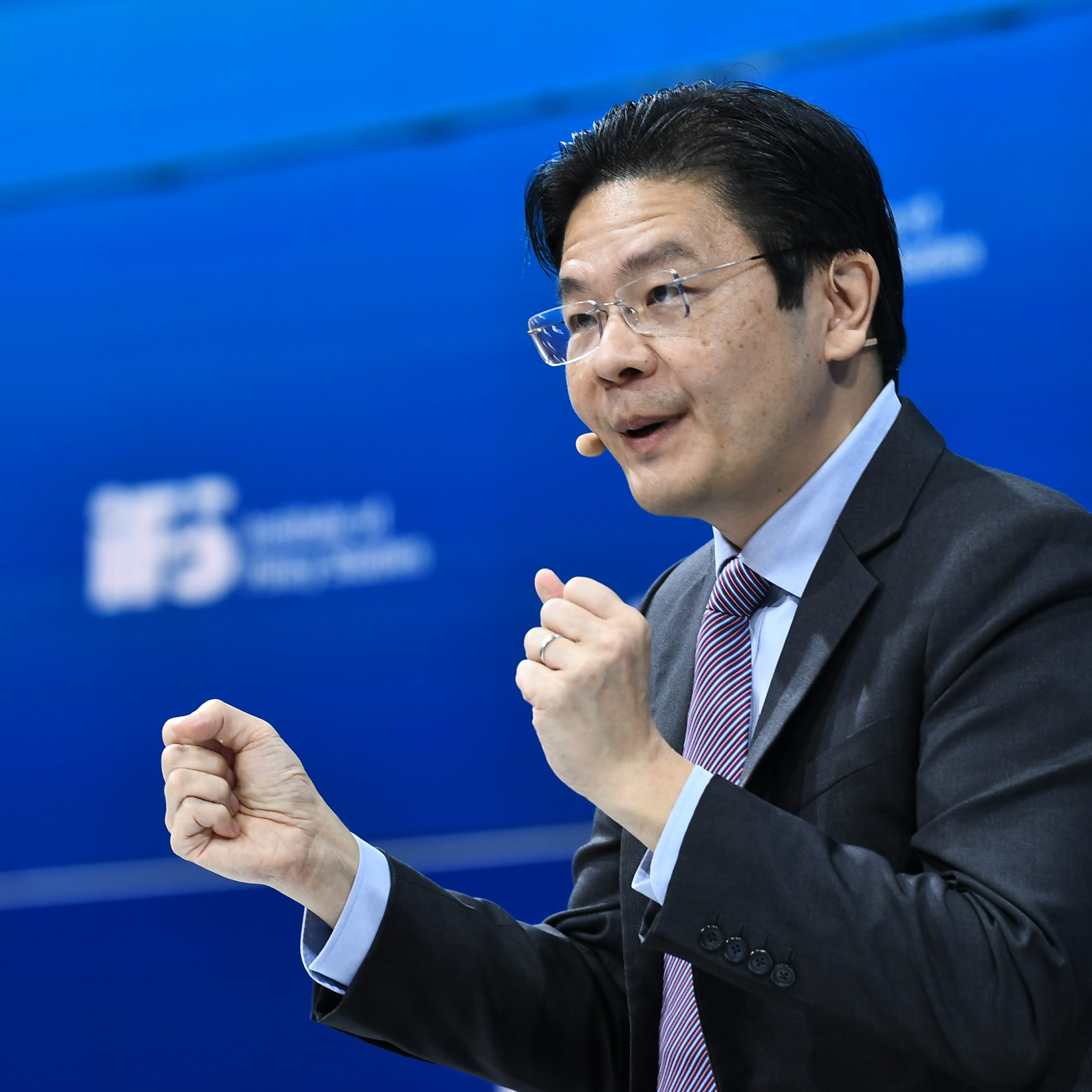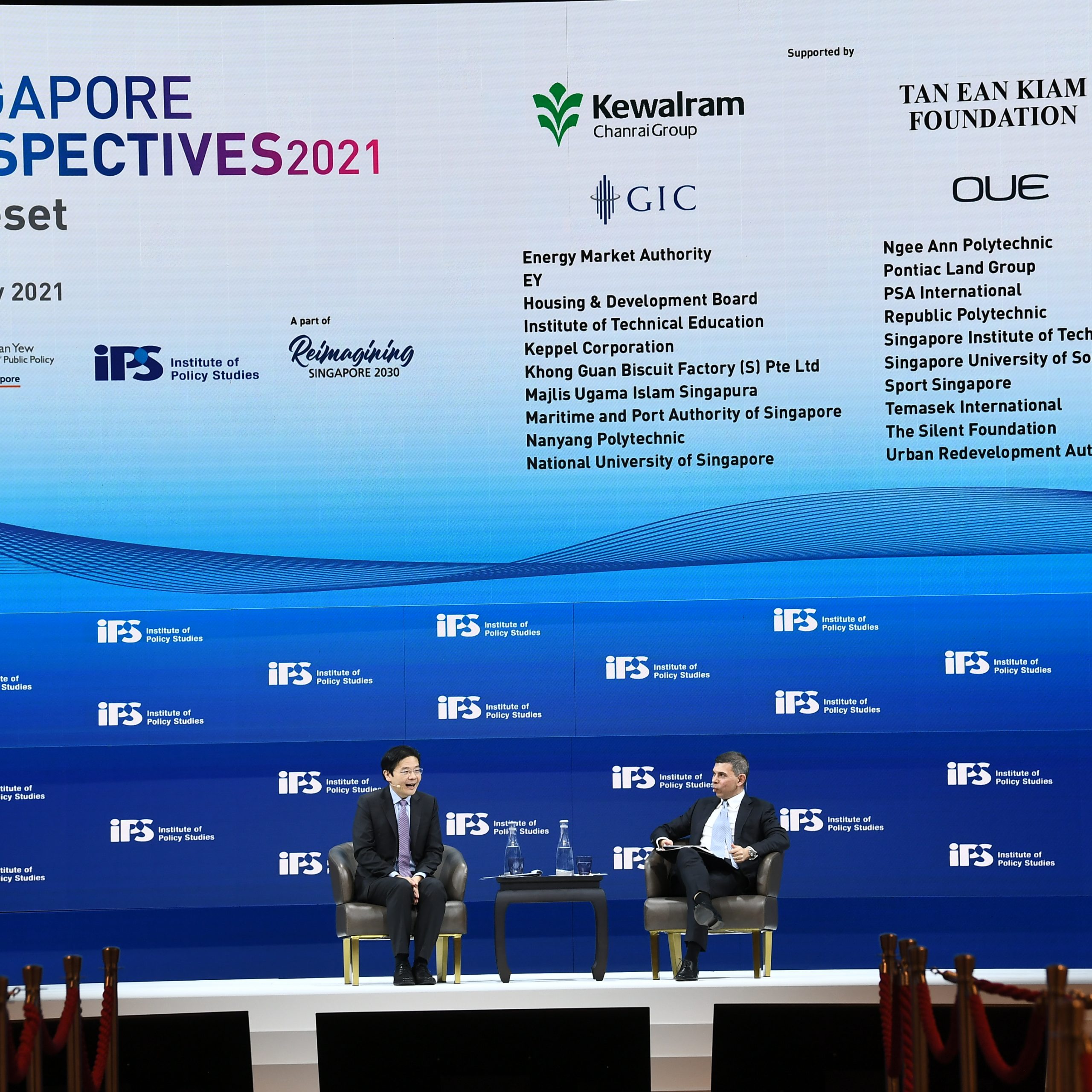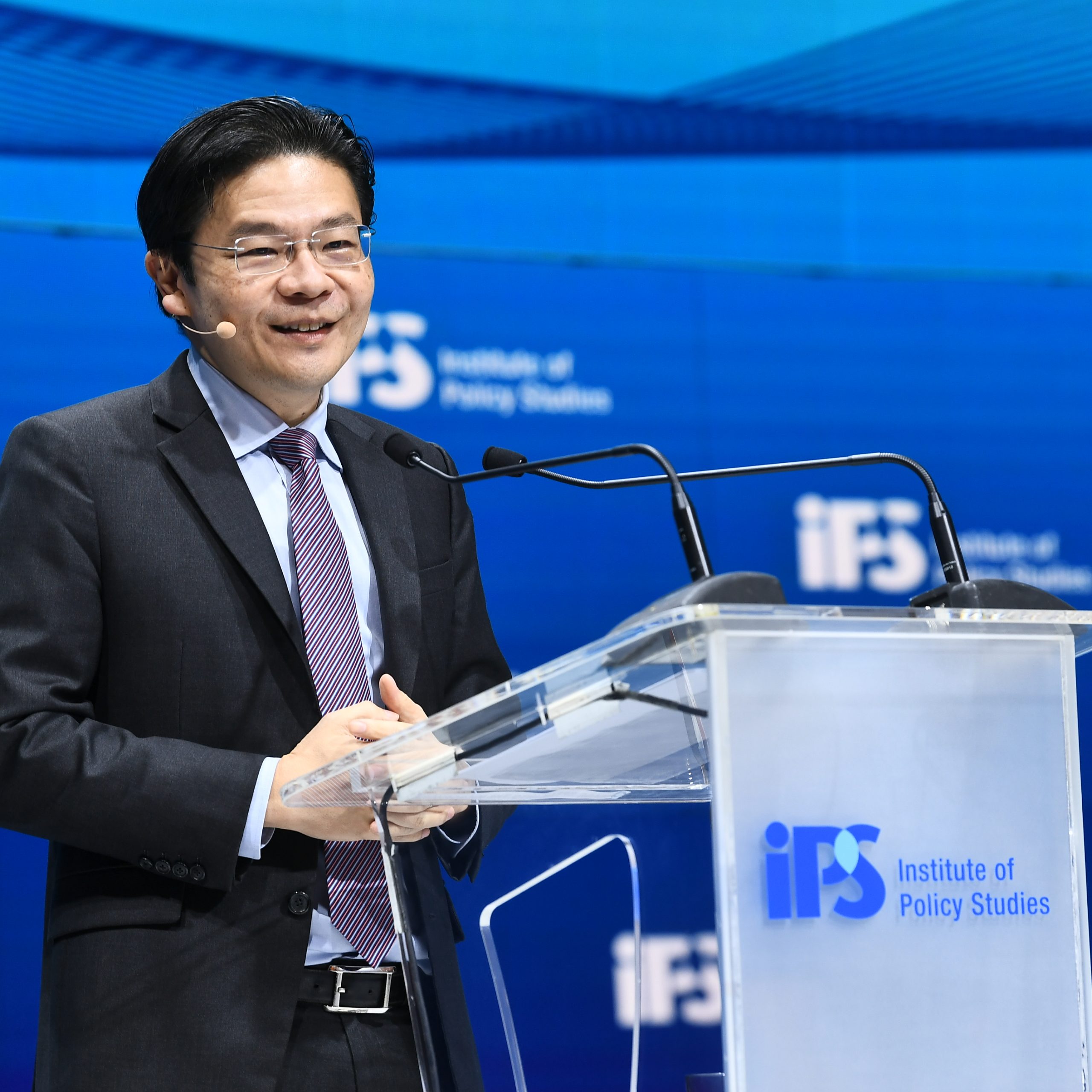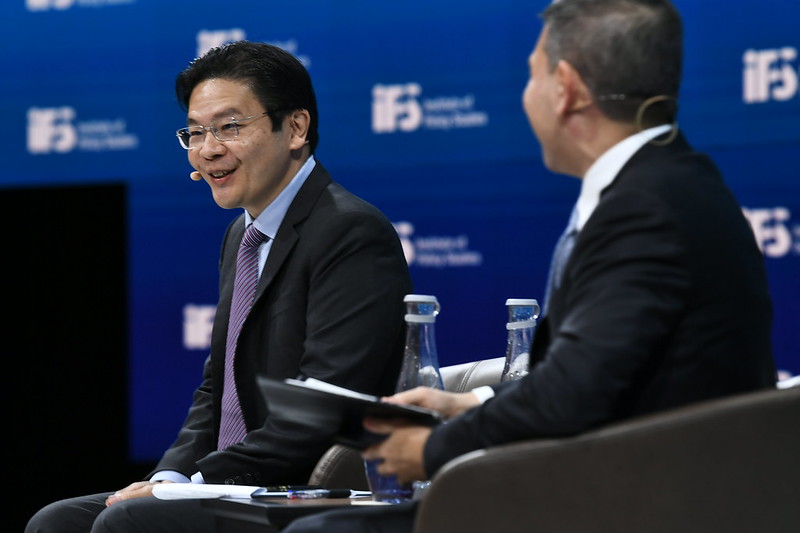Education minister Lawrence Wong, chiefly associated with Singapore's Covid-19 response as its co-chair, delivered a wide-ranging national speech at the Singapore Perspectives 2021 conference hosted by the Institute of Policy Studies (IPS) on Monday (Jan. 25).
The co-chair of the multi-ministry task force on Covid-19 outlined a vision for a fairer, greener, more united Singapore post-Covid-19 in IPS' annual flagship conference.
In one of the more powerful moments of his speech, Wong said,
"So which path will apply to Singapore? How will the pandemic change us? I am confident that we will prevail and emerge stronger from this crucible. And I do not say this lightly.
I speak from my own conviction of seeing the best of Singaporeans over the past year, in the face of adversity and very tough conditions."
As author James Fallows noted in a recent Atlantic article on President Joe Biden's inauguration address, successful political speeches follow a simple set of rules -- authenticity (match the essence of the speaker), realism (understand the world in which the listeners live), and to tell two stories (who we are, and who I am).
Judged against these rules of speech style, Wong has achieved them in his keynote speech, giving a glimpse of how he and the other 4G leaders will lead a post-Covid-19 Singapore.
So what is Wong's speech about, why is his speech and remarks refreshing and what is the significance of Wong's strong performance at Singapore Perspectives?
Wong's speech — the three "resets"
 Photo Credits: Jacky Ho, for the Institute of Policy Studies.
Photo Credits: Jacky Ho, for the Institute of Policy Studies.
What are the three resets Wong proposed for Singapore?
The first "reset" that Wong hoped was for Singapore to emerge from the pandemic as a “fairer and more equal society”.
He said that the bottom line is that the government aims to give Singaporeans more assurance in an uncertain post-Covid world.
The second "reset" was Wong's push for was a “greener” Singapore, calling climate change an “existential emergency”.
Wong said that sustainability can be Singapore's new source of competitive advantage, which will open up new opportunities for growth and job creation (for instance, carbon trading and services hub in Asia, leading centre for Green Finance).
But he emphasised that the greatest promise of going green is about building for the future — for our children and the next generation.
The third "reset" was Wong's view that there is an opportunity for Singaporeans to "strengthen our sense of social solidarity", and to build a better society together.
And that’s why the government is intentionally creating more opportunities for Singaporeans and stakeholders to be part of decision-making processes — including in policy and implementation, Wong added.
Wong's refreshing take on things
 Photo Credits: Jacky Ho, for the Institute of Policy Studies.
Photo Credits: Jacky Ho, for the Institute of Policy Studies.
Wong's speech did not propose anything new in terms of policies or policy directions, and maybe he should have put out a few policy trial balloons.
But it was plain and direct, providing a sense of realism to how the world will or will not change after Covid-19.
And his speech sounded like the man -- full of conviction, with a mix of optimism in Singaporeans --, as he shared his experiences in the very tough Covid-19 year he experienced.
Take this view on leading the Covid-19 response and his interactions with Singaporeans:
"I’ve seen frontline workers both in the public and private sectors giving their all, round the clock. I’ve seen many ground-up initiatives – people stepping out of their comfort zone to look out for the vulnerable, and to help those in need. And I’ve seen the resilient attitude that Singaporeans have shown, affirming the values we have nurtured since the founding of our nation".
His remarks matched the current mood.
When asked by Straits Times editor Warren Fernandez on what made Wong so confident that Singapore could emerge better in the wake of the pandemic, Wong was able to bring up examples of Singaporeans rallying together, from his own personal encounters.
Even Wong's take on founding Foreign Minister S Rajaratnam was different from other leaders.
Over the years, a number of political leaders -- Prime Minister Lee Hsien Loong, Deputy Prime Minister Heng Swee Keat, Speaker Tan Chuan-Jin and Wong himself -- have been using the term "democracy of deeds", first coined by Rajaratnam, in their speeches.
"Democracy of deeds" is widely used by the leaders to describe the involvement of public-spirited citizens to work together with the government to solve practical problems in practical ways.
In fact, Wong himself was among the first 4G leader to introduce the "democracy of deeds" concept in his first Singapore Perspectives Conference in 2013.
Now Wong has re-introduced another term used by Rajaratnam — “asabiyyah".
Wong's concern was that there were already powerful forces — fake news, cynicism — chipping away at social cohesion in Singapore before Covid-19.
And hence, Wong hoped that Singaporeans can forge a stronger sense of group solidarity and social cohesion after the Covid-19 pandemic.
In his speech, Wong said that Rajaratnam would refer to the ideas of 14th century Islamic philosopher and historian Ibn Khaldun, using the concept of “asabiyyah” to describe the bond that exists in a community.
So what is “asabiyyah”?
"[I]t’s this sense of community and solidarity that explains the rise and decline of society. When a community starts out, everyone is prepared for austerity and discipline together, people are prepared to make sacrifices for the common good, and society prospers.
But as life becomes more comfortable, this sense of solidarity is weakened. People lose their social anchors and seek to advance their own individual interests. And when that sense of community and common purpose is eroded, things start to fall apart."
For history buffs, Rajaratnam first used this concept in a 1979 'advancement of science' speech to describe the rise and fall of civilisations.
And the reason for Wong's inspiration?
He told the audience that he got it from a book of Rajaratnam's speeches that esteemed diplomat and academic Chan Heng Chee edited.
While Wong's interpretation of the government's policy responses are refreshing and different from other 4G leaders, some may be expecting ideas that are more concrete.
For instance, Wong could have elaborated on how the government's permanent shift towards the strengthening of social safety nets would be different from the previous generations.
And when Wong mentioned about a broader mindset change in the intervention of education policies for a fairer society, one hopes to hear more about how merit can be more broadly defined in future.
Significance of Wong's performance at Singapore Perspectives
 Photo Credits: Jacky Ho, for the Institute of Policy Studies.
Photo Credits: Jacky Ho, for the Institute of Policy Studies.
For context, the Singapore Perspectives is an important annual conference that brings together politicians, academics, intellectuals and other public figures to discuss the most pressing issues that concern Singaporeans.
Starting from 2010, a Minister has always been involved in the SP. Here is the list below.
-
- 2010: Lee Hsien Loong.
- 2011: Wong Kan Seng, Lim Boon Heng. (Maliki Osman and Ong Ye Kung were also involved. However, Ong was not a Minister yet.)
- 2012: Tharman Shanmugaratnam.
- 2013: Lee Hsien Loong, Lawrence Wong.
- 2014: Heng Swee Keat, Sim Ann.
- 2015: Teo Chee Hean, Chan Chun Sing.
- 2016: Ng Chee Meng, Ong Ye Kung, Heng Swee Keat, Chan Chun Sing.
- 2017: Ong Ye Kung.
- 2018: Teo Chee Hean, Heng Swee Keat.
- 2019: Vivian Balakrishnan.
- 2020: Heng Swee Keat, Chan Chun Sing
- 2021: Lawrence Wong.
And one will note that since 2013, at least one of the 4th-generation leaders has been involved in the event.
As one would also notice, DPM Heng, the front runner for the next PM, has been invited to speak four times, which is more than any other 4G leader — Chan Chun Sing (three times), Ong Ye Kung (two times), Lawrence Wong (two times).
Whether Wong wished for it or not, his speech and performance has drawn him into the attention of the public, beyond his usual appearances at the Covid-19 press conference.
With the public attention mainly on the two 4G leaders (DPM Heng and Chan) previously, Wong's refreshing take on governance adds a new and different dimension to how the 4G leaders will communicate to Singaporeans.
It's just that Wong did not have many national platforms to showcase how he communicated to the public previously.
And if you are wondering how Wong communicated before the Covid-19 crisis, here's a snippet from his maiden speech in 2011, more than a decade ago:
"Mr Speaker, Sir, I have spoken about the anxieties and concerns of Singaporeans, but I hope I have also given sufficient reasons for us to be confident and optimistic about our future. Sometimes, we hear talk about a gap between the government and the people. But the government is elected by the people, for the people. We are all in this together, even if we may sometimes disagree. We must bridge our differences and reach across divides. And as we connect the dots of our shared existence, we can all look forward to the promise of a stronger, more cohesive nation".
Sounds familiar?
It is a good start that Singapore has a policy wonk who has been through tough times and is sincerely optimistic about what Singaporeans can do together.
And one hopes that Wong, together with his colleagues, will also be able to add more shape to his vision of a fairer, greener, more united Singapore in time to come.
Top photo from Institute of Policy Studies Flickr
If you like what you read, follow us on Facebook, Instagram, Twitter and Telegram to get the latest updates.
